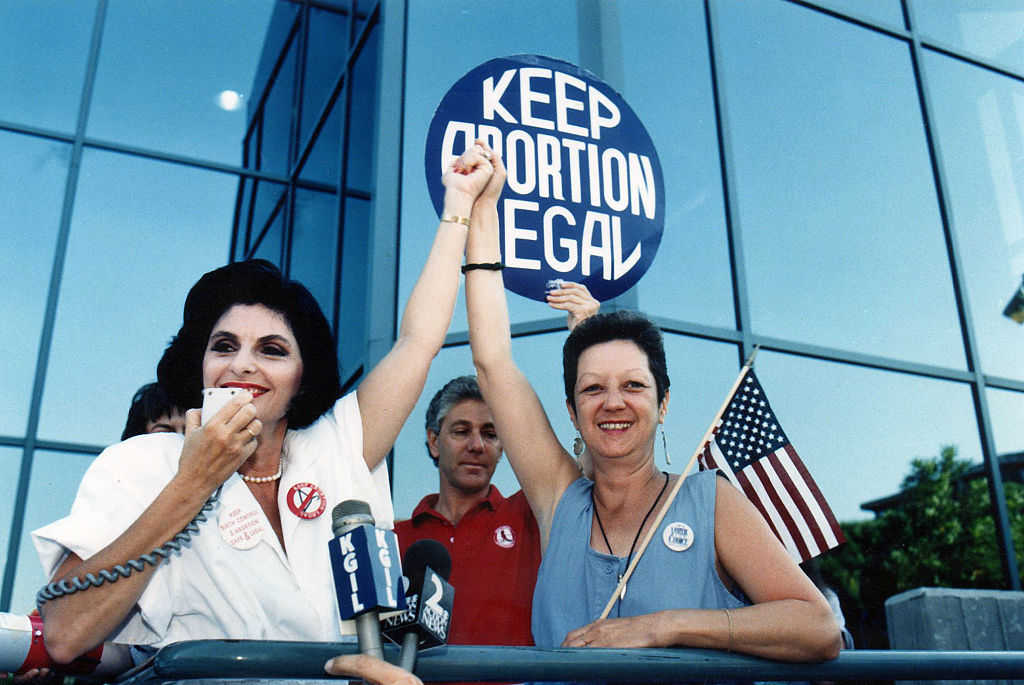As pro-choice activists celebrate the 45th anniversary of Roe vs. Wade — the Supreme Court case that legalized abortion across the U.S. — pro-life advocates are lamenting the end result: an estimated 60 million abortions.
READ: Should Haitians Come to the U.S.? Here’s Why One Missionary Says No
The abortion debate aside, many Americans might not realize that a woman named Norma McCorvey was the plaintiff in the now-infamous court case. McCorvey died in February 2017, but her life and legacy continue to attract attention.
The complex figure, who worked as a pro-choice activist before later becoming an outspoken pro-life Christian, has sparked both controversy and inspiration over the years. Here are six fast-facts you might want to know about her life:
—
McCorvey Never Aborted the Baby at the Center of the Roe v. Wade Battle
McCorvey’s identity didn’t become public knowledge until the 1980s — more than a decade after the infamous 1973 Supreme Court decision. Before that, she was simply known by the pseudonym “Jane Roe,” which was used during her lawsuit against Dallas County District Attorney Henry Wade.
See, McCorvey was pregnant with her third child at the time and wanted an abortion; she was just 21 years old. But, after she failed to receive an abortion (it was illegal in Texas unless the mother’s life was on the line) and decided to sue, the case dragged out so long that she never had the chance to terminate her pregnancy.
She ended up later giving the baby up for adoption, according to CNN.
She Underwent at Least Two Shocking Spiritual Transformations
Decades after helping legalize abortion nationwide and after participating in the pro-choice movement, McCorvey ended up doing an about-face in 1995, converting to evangelical Christianity and embracing a totally new mantra: calling herself pro-life. Soon after, she became a Catholic and continued her newfound fight against abortion.
Just a year before her conversion, her 1994 book, “I Am Roe: My Life, Roe v. Wade, and Freedom of Choice,” included “abortion-rights sentiments,” according to the Associated Press. But, during a 1998 Senate subcommittee she proclaimed, “I am dedicated to spending the rest of my life undoing the law that bears my name.”

McCorvey Once Lied About a Key Detail in the Pregnancy at the Center of the Roe vs. Wade Case
After revealing her identity to the public, McCorvey said that a key claim she made about her pregnancy — that she was raped — was false. On the surface, this didn’t matter legally speaking, as the rape was never part of the defense’s case.
Still, it was notable among pro-life activists that McCorvey — who had told media that the rape led to the pregnancy — later admitted in 1987 that this simply wasn’t the case, as Vanity Fair reported in 2013.
She Once Worked Hard to Try and Overturn Roe
McCorvey, who once volunteered for pro-abortion causes, later ended up trying hard to overturn Roe vs. Wade, but her efforts fell flat.
It was back in 2004 that McCorvey appealed to the 5th U.S. Circuit Court of Appeals in New Orleans, Louisiana, in an effort to try and convince judges to consider her argument that abortion leaves women with long-term emotional issues. Her argument — and case — were dismissed.
McCorvey Had a Complex Upbringing
Perhaps no profile best explains the purported difficulties McCorvey faced than a 1994 New York Times profile that detailed her once long-term same-sex relationship as well as the series of difficulties she faced earlier on in her life. Here’s a snippet:
Her grandmother was a prostitute and fortuneteller. Her father was a television repairman, her mother an alcoholic. Part Cajun, part Cherokee Indian, and raised as a Jehovah’s Witness, Norma Leah Nelson was 10 when she took money from the gas station where she worked to run away from home. After that, her education came from reform schools until the ninth grade. By the time she was 15, she had been sexually assaulted by a nun and a male relative of her mother’s. At 16, she married an itinerant steel worker, Woody McCorvey, who, she says, beat her. She left him and returned to her mother’s house in Dallas with plans to raise her unborn child alone.
But after her daughter, Melissa, was born and Ms. McCorvey confided in her mother that her sexual preference was for women, she says, her mother kidnapped Melissa, banished Ms. McCorvey from the house and raised her granddaughter herself. Ms. McCorvey writes that when she was drunk, her mother tricked her into signing adoption papers, giving away custody.
Clearly, McCorvey had a difficult life.
—
She Wasn’t All That Involved in the Supreme Court Case
As already mentioned, McCorvey had already given birth by the time the Supreme Court reached a verdict on her appeal; the child was, in fact, already 2-years-old, as the process took three years from start to finish.
But a more shocking fact might be the revelation that McCorvey had very little to do with the case, which was spearheaded by attorneys Sarah Weddington and Linda Coffee.
According to the New York Times, she “had little contact with her lawyers, never went to court or was asked to testify, and was uninvolved in proceedings.” In fact, McCorvey learned about the verdict just like most other Americans: by reading the newspaper.



